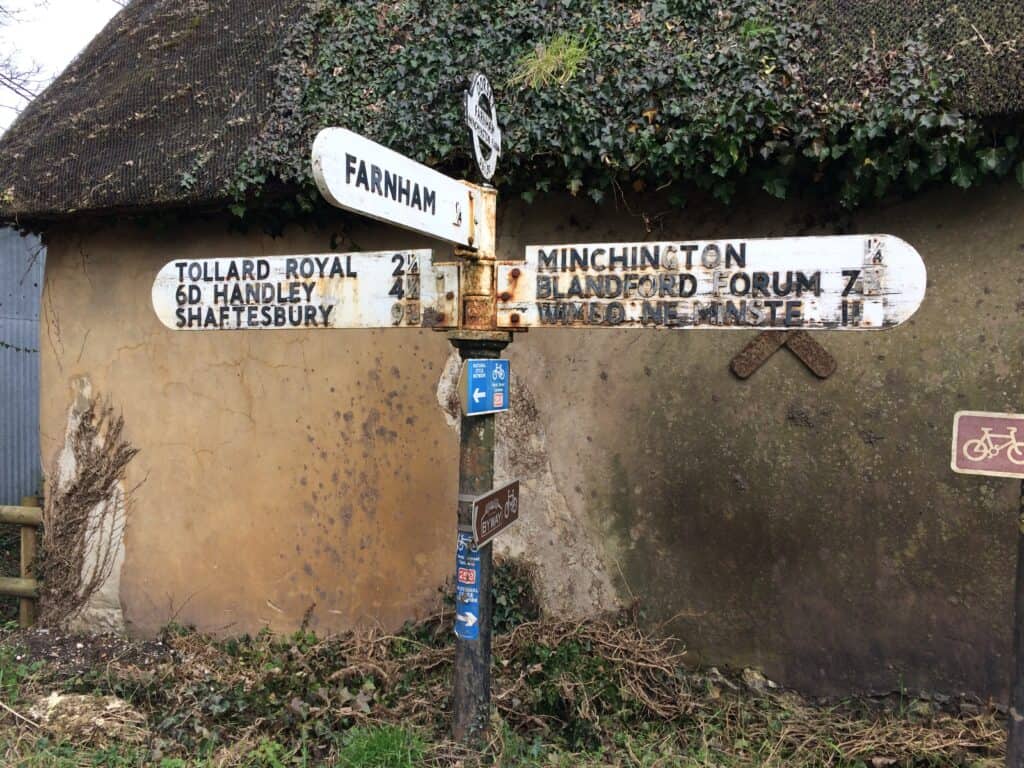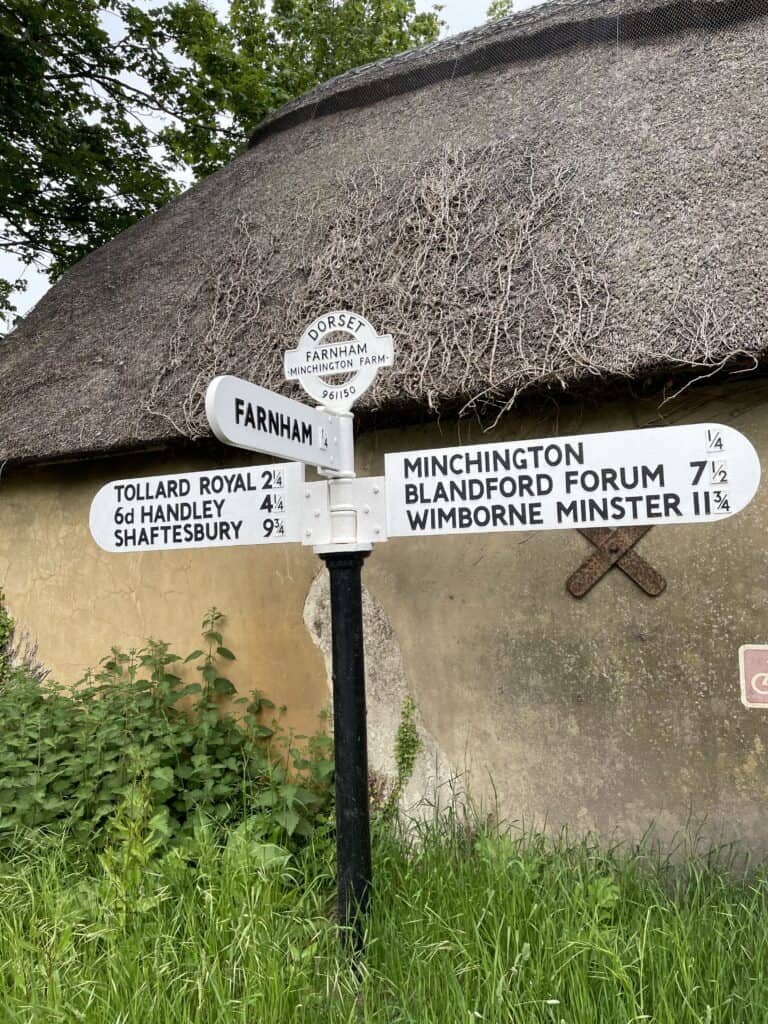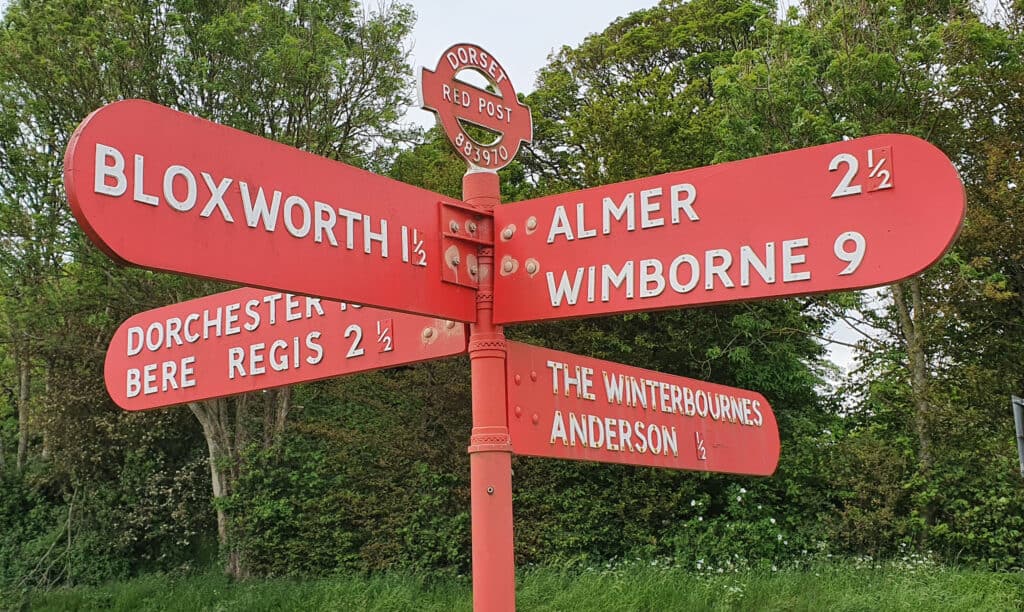Dorset’s fingerposts are an iconic sight; the old road signs featuring a white or occasionally red metal roundel, with arms, known as fingers, pointing in the direction of travel.
They are a common feature of the Dorset countryside, a legacy of the early road system. In 1773 the General Turnpike Act made it mandatory for trustees to put up signs informing the traveller of the distance to the closest town.

In the 20th century the responsibility for fingerposts was given to individual local authorities; the Ministry of Transport recommended a design but it was left up to individual councils to make the final decision, which meant that there was a wide variety of local styles. The Ministry for Transport specifically asked the County Councils in Dorset and the West Riding of Yorkshire to experiment with the inclusion of a grid reference and this style of fingerpost roundel remains unique to these two council areas.
Dorset Council created its own distinctive finger post design; constructed with a central metal post, with a number of white wooden pointers or fingers, originally with curved ends but more recent ones may have pointed fingers.
The destination on the sign is in black, individual, upper case metal lettering, together with the mileage.
On the top is the white metal roundel (just like the London Underground sign), on which the name of the junction is displayed on the horizontal bar. The six figure grid reference is on the bottom half of the roundel, ‘Dorset’ is painted in black, on the top half.
Some of the posts have interesting spellings as well – Sixpenny Handley often shows a frugal use of letters pre-decimalisation with ‘6D Handley’. Fingerposts near Child Okeford still retain the ‘e’ on Child, which has since been lost.

Dorset is also famous for its four red fingerposts – though they are a source of some debate. Were they the locations of gibbets?
The Red Post fingerpost on the A31 was more likely painted red to help prison guards find the local lock-up at the nearby Botany Bay Farm, when accompanying prisoners marching from the Dorchester assizes to the ships at Portsmouth which would convey them to Australia.
Of the 1300 or so fingerposts thought to exist in the 1950s, less than half survive today. Many were lost in WWII; removed in 1940 to deny guidance to an invading army, and never replaced.
Some of the originals have been repaired using non-traditional materials or lettering, and others are in need of attention.
Now the Local Authority no longer has a remit to repair them, both the Dorset Area of Outstanding Natural Beauty (AONB) and Dorset CPRE are keen to support local ‘Fingerpost Champions’ to save these signs from extinction and restore them back to their former glory.
Hundreds of signs are now being renewed by community groups, and individuals.
Roger Bond (Normtec) co-ordinates the Dorset AONB Fingerpost restoration project, working from his home workshop. Normtec are restoring existing lettering and numbers to their former glory whilst Coles Casings provide new stock ready for painting.

If cost is an issue then Dorset AONB are delighted to offer the services of the Dorchester and Blandford Mens’ Sheds, and at HMP Guys Marsh and Youth Offenders Institute on Portland.
Dorset CPRE offer a small grants scheme for people wanting to restore fingerposts using the correct materials as set out by the Dorset AONB.
Match funding is not required, and there is no application form; the CPRE simply ask that requests come from a Parish Council representative (or similar), with a summary of the fingerposts that need repairing, their location(s) and details of who the cheque needs to be made payable to, or bank accounts details for online payments.
Dorset CPRE are covering all of Dorset, and are prepared to award up to £200 per post.
We have now spent or allocated £15,000 on grants for 119 fingerposts with many in North Dorset.
These include Melbury Abbas, East Stour, Farnham and Motcombe to name a few.
To find out more contact Linda Williams on info@dorset-cpre.org.uk or 0333 577 0360.
It is so important that we preserve these Dorset icons!
Rupert Hardy, Chairman,
North Dorset CPRE


